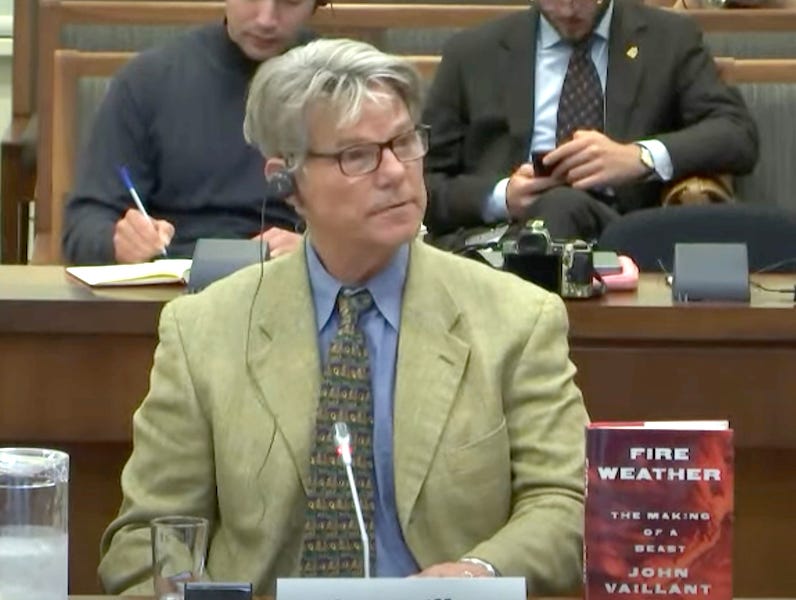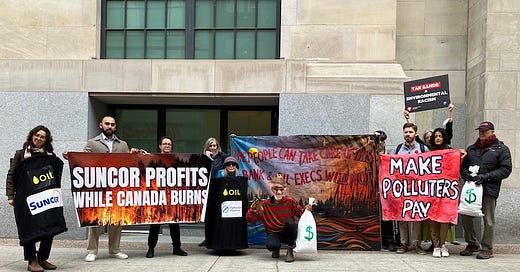Time to Seize the Narrative
Calling out an oil for being greedy doesn’t tell anyone anything new. While we have the mic, how about calling everyone in to a climate solutions agenda?
One of the most instructive moments in Suncor Energy CEO Rich Kruger’s appearance before the House of Commons natural resources committee last week took place before the hearing actually began.
Kruger’s hour of spin and deflection was predictable enough that I was sorry we never followed through on our plan to publish a Bitumen Bingo card to mark the occasion. (Anyone can play! Just log on to the video feed, listen carefully, fill out the squares as the catch-phrases go by, and whoever’s first to fill in a row, column, or diagonal gets to jump in the air and shout a ‘B’ word that is neither ‘Bitumen’ nor ‘Bingo’.)
But something a whole lot more genuine unfolded outside the hearing room, on Ottawa’s Sparks Street Mall, about half an hour before the more scripted part of the day. A small group of protesters had gathered behind signs and banners, one of them quite accurately declaring that “Suncor profits while Canada burns”. At the end, one of the protesters came over and introduced himself.
“We need a new narrative,” longtime climate activist David Beddoe told me. “Demanding that [fossil] CEOs and investors stop being greedy doesn’t work.” Much as that agenda reflects the reality of a cascading climate emergency, “it’s fundamentally impossible in a system geared to profit-taking.”
So while more and louder public protests are needed as the climate crisis deepens, Beddoe said, messaging should expand to include alternatives like steady-state economics that “encompass human and ecosystem needs.” At present, “we’re written out of that scenario, and it has to be brought back.”
Programming note: Tech giants Google and Facebook/Meta are blocking Canadian media from their news platforms. That makes email subscriptions to The Energy Mix and the Energy Mix Weekender your best antidote to make sure you always get the climate news you need. Subscribe today and never miss another edition!
Suncor’s World Has Disappeared
Beddoe’s words landed powerfully with me, partly because he made such a good case, partly because I’d been thinking the same thing. Before the morning was out, we would see that Rich Kruger was living in a world that has disappeared:
Where fossil executives can continue to ignore, deny, or wish away the dire impacts of climate change.
Where it’s realistic, permissible, or even minimally civilized for Kruger to focus his 2050 net-zero reduction promise on his company’s operational emissions, neatly sidestepping the 80% or more of the carbon in a barrel of oil that gets burned and emitted by the end users for his product.
Where oil and gas demand isn’t expected to peak before 2030, and half of the world’s economies aren’t already past peak fossil fuel demand in electricity.
Where renewable energy investment isn’t outpacing new spending on fossil fuel extraction.
Where wind and solar with battery storage aren’t already cheaper than natural gas in places like Alberta and Ontario, and renewables aren’t the least-cost path to faster, deeper carbon cuts world-wide.
Where unicorn technologies like carbon capture and storage are real-world options, not costly, clunky distractions—even though Kruger’s industry peers freely admit that CCS won’t be ready in time to meet an all-important 2030 emission reduction target. (Their solution: Try to rip off taxpayers for more subsidies.)
And where climate lawsuits aren’t yet the mounting threat to the industry that MP Charlie Angus described during the hearing.
On all of those dimensions and many more, the scene is changing, faster than most of us can keep track of. If Kruger and his ilk are following the trends behind the scenes, they aren’t saying it out loud.
As climate hawks, we can’t afford to fall into the same incomplete thinking. If we’ve set out to build a carbon-free future, our narrative has to be wide enough to show it.
Beddoe laid the foundation for that new thinking when I reached him for follow-up comment a couple of days after the hearing.
“I can’t emphasize enough that people have to stop looking to the big fossil companies for anything,” he said. “Their political and economic influence has to be diminished to the extent that we can take back our government and our climate and our land and water. Because they’re ruining everything.”
Under the “reductionist view” that has guided the economy since the Second World War, it “really is futile” to expect those companies to change, Beddoe said. “They’re following algorithms, they’re following quantitative analysis, and this is what makes more money in the shorter term.” Even with that system driving us to an ecological precipice, “I don’t see that asking any of the powerful players to change voluntarily is going to work” without changing the rules of the game.
Plan B is Already Happening
But if engaging with fossil companies, asking them nicely to do better, or even confronting them with the damning statistics and contradictions of their own business plans and investment priorities isn’t bringing us the change we need, at the pace science demands…what’s our Plan B?
Peter McKillop, the former BlackRock and Bank of America executive who founded Climate & Capital Media, agreed that no business or investor will voluntarily accept a lower rate of return—so the impetus has to come back to governments and other public institutions.
“I’ve always said that if you want to change behaviour, change the law,” McKillop said. “No bank is going to do this by itself, but if it happens through regulatory means, of course they’re going to do it.” The problem is that those regulatory processes have been captured by the fossil lobby itself—making it easy for a figurehead like Kruger to follow the rules that his lobbyists are working day in, day out to delay and weaken.
All of which sets the stage for the kind of display we saw on the Sparks Street Mall last week. “It’s theatre, but every great transition in politics is about theatre,” McKillop said. “You have to be hitting at all levels,” with a coordinated effort that includes legislation, regulatory and legal reform, class action suits, shareholder activism, street action, and more.
But there’s a whole other, essential side to that Plan B.
We already know what it will take to drive down the greenhouse gas emissions that are warming the atmosphere and baking the planet. We’ll get it done by drastically increasing the energy efficiency of everything. Decarbonizing electricity. Using those newly-cleansed electricity systems to replace major sources of fossil fuel demand like transportation and home heating and cooling. Getting serious and evidence-based about nature-based carbon capture in forests and soils. And calling out greenwashing wherever it happens.
Getting the Memo
None of those solutions is moving far enough, fast enough to get climate change under control—not yet. There are still lots of obstacles to clear, and look no farther than Rich Kruger’s self-serving testimony for proof that the incumbent interests driving climate chaos aren’t going to go away quietly.
But even if we still need to pick up the pace, change is happening at an unprecedented pace. And our institutions are starting to get the memo.
Megan Darby of Climate Home News captured the shift last week, in a LinkedIn post announcing that she’s stepping down after nine years with one of the world’s best and smartest climate news sites, the last three as editor.
When she first joined the publication, “often Climate Home would be the only media asking the climate question at an oil conference or reporting the climate line out of a G20 summit,” she wrote. “Since then, the Paris Agreement was adopted, the frequency and severity of climate disasters intensified, and climate went from being one line in a speech to a consistently top-3 item on the international agenda. Legacy [news] outlets started hiring climate reporters, then entire climate desks.”
That same, profound shift in consciousness is playing out everywhere you look. From senior levels of government introducing new fossil industry regulations and clean energy incentives, to cities looking to their climate plans to create jobs and reduce vulnerability in local emergencies. From key business sectors turning to efficiency and renewables to cut costs and boost profits, to countless recent grads coming out of colleges and universities with the next bright idea to bring down emissions.
All of these rapid, accelerating gains make climate work more hopeful, and more complicated, even as the need for results gets more urgent. It means the new narrative we need is too long and too varied to fit a protest banner. That declaring a fossil executive a climate criminal isn’t the whole story, even if it’s still, often enough, the opening line.
But we know we’re gaining ground when so many more people and institutions can see themselves in a picture of climate solutions, and are starting to move in that direction.
Mitchell Beer traces his background in renewable energy and energy efficiency back to 1977, in climate change to 1997. Now he and the rest of the Energy Mix team scan 1,200 news headlines a week to pull together The Energy Mix, The Energy Mix Weekender, and our two weekly e-digests, Cities & Communities and Heat & Power.
You can also bookmark our website for the latest news throughout the week.
Video of the Week

Suncor Boss Doubles Down on Oil’s Future, Ducks MP’s Questions on Fossil Liability
Oil and Gas Cap to Proceed While Feds Respond to Supreme Court IAA Ruling
Nova Scotia Picks Wind, Solar, Storage Over Atlantic Loop
McDonald’s Failing to Follow Through on Climate Promises, Critics Say
Exxon Emerges as Oil ‘Megamajor’ As Peak Demand Nears
Mobile Microgrid Builder Makes Renewable Power Beautiful
Youth Fill Out Mock Application Letters for Youth Climate Corps
District Energy Conserves Water, Cuts Emissions on Both Sides of the Great Lakes
‘Substantial Damage’, No Injuries as Freight Train Hits Wind Turbine Blade
Enbridge CEO urges federal government to offer loan guarantees to help Indigenous communities buy into projects (Globe and Mail)
EverWind, NS Power in talks to forge long-term power purchase deal (Guysborough Journal)
RCMP opens probe into Ontario’s cancelled Greenbelt development plans (Globe and Mail)
800,000 tons of radioactive waste from Pennsylvania’s oil and gas industry have gone ‘missing’ (The Daily Climate)
Virginia solar program delivers clean energy to elderly, low-income households (Energy News Network)
Why efficient buildings are key to decarbonizing the power grid (Canary Media)
Vessel Strikes on Whales Are Increasing With Warming. Can the Shipping Industry Slow Down to Spare Them? (Inside Climate News)
In Brazil’s Amazon, rivers fall to record low levels during drought (The Associated Press)
China, India worst hit as half a million coal workers face job cuts globally by 2035 (South China Morning Post)
Skills shortage delays global energy transition, puts climate targets at risk (Clean Energy Wire)
Battery storage failures highlight reliability challenges of inverter-based resources (Utility Dive)
Slovakia president rejects nomination of opponent of climate change policy as environment minister (The Associated Press)







